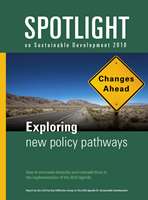Social Watch E-Newsletter - Issue 347 - June 24, 2019
Published on Mon, 2019-06-24 15:06
 |
| Issue 347 - June 24, 2019 |
|
| |
| |
|
| |
Addressing the hidden dimensions of poverty
|
| |
|
| |
“Ending poverty in all its forms everywhere” - the overaching goal of the 2030 Agenda for Sustainable Development - reflects the growing consensus on the need to consider other dimensions, beyond monetary ones, when thinking about poverty.
Last May, ATD-Fourth World and the OECD organized an international debate on “Addressing the Hidden Dimensions of Poverty” that advocated for multidimensional and participative approaches. The "Merging Knowledge" methodology, bringging together people living in poverty from different regions with academics and practicioners evidenced that despite differences in income, the daily lives and feelings of poor people across countries, are surprisingly similar. Read more and see the video here
|
| |
|
| |
|
| |
Women continue to lag behind in Ghana
|
| |
|
| |
 |
"As of 2019, women’s representation in Parliament remains at an abysmal 13.7% and women constitute only 18.55% of all ministerial appointments. For the first time since its creation, the Gender Ministry no longer has cabinet status. Sexual and gender-based violence remains a big problem, notwithstanding the existence of the Domestic Violence Act, and budgetary allocations for effective implementation of the law is low." This is one of the conclusions about gender disparities in Ghana, as diagnosed by NETRIGHT, a network of about 100 civil society organizations and over 300 individuals. Netright believes that "the conditions of marginalized or disadvantaged groups, including women, can never be improved solely through their own efforts, no matter how dynamic they might be, since systemic barriers and structures of male privilege and dominance maintain the status quo."
States have an obligation to create the enabling environment for all citizens to thrive and contribute to development and Netright considers that "Ethiopia, Rwanda, South Africa and Senegal provide examples of political will and leadership on women’s representation and participation in decision-making. This is in contrast to the situation in Ghana where women continue to lag behind in many sectors of public life and decision-making". Read more.
|
| |
|
| |
|
| |
Trading away the SDGs?
|
| |
|
| |
Trade and trade-related policies and international agreements are addressed explicitly in seven of the 17 Sustainable Development Goals (SDGs) and are identified as key to implementation of the 2030 Agenda and of the Addis Ababa Action Agenda (AAAA). Market access is deemed essential to promote the graduation of the LDCs (targets 10.a, 17.11 and 17.12) and to improve the livelihood of small food producers (target 2.3). Trade distortions are to be dealt with, reducing subsidies on agriculture (target 2.b), on fossil fuels (12.c), and on fisheries (14.6). Capacity-building on trade is required (target 8.a) and the WTO is urged to complete the Doha Round (target 17.10) as one of the key means of implementation for the whole Agenda. Yet, after having unanimously committed themselves at the highest level to these objectives at the UN, governments are failing to translate those promises into action at the World Trade Organization (WTO). Read more.
|
| |
|
| |
|
| |
Human rights obligations and inequalities between countries
|
| |
|
| |
 |
The issue of inequalities between countries is often conceptualized and measured in terms of GDP. Moreover, the way to reduce these is often implicitly assumed to be convergence upwards through rapid growth. However, although economic growth may be important for many countries (especially LDCs), global convergence with the GDP of the richest countries would be environmentally catastrophic without "decoupling" growth from nature destruction. In the context of SDG 10, there is an urgent need to look more holistically at power imbalances and inequalities between countries. Even economic power is far broader than just GDP. Trade balance sheets, size of sovereign wealth funds, access to natural resources, sway over trade negotiations and global tax regimes, currency strength, size of national debt; all of these contribute hugely to inequalities between countries. Decision-making in global economic governance is also crucial of course, as represented in SDG target 10.6. But imbalance of decision-making power (and power more generally) goes much further than just voting rights in international institutions. First, there are many regional or exclusive international institutions, such as the OECD or the G20, which have a great deal of power over the global economic environment (more so than some ‘global’ institutions), and where developing countries are de facto not invited to the decision-making table. Read more
|
| |
|
|
|
| |
|
SOCIAL WATCH IS AN INTERNATIONAL NGO WATCHDOG NETWORK MONITORING POVERTY ERADICATION AND GENDER EQUALITY Social Watch >>
Social Watch E-Newsletter For comments, sugestions, collaborations contact us at: socwatch@socialwatch.orgTo stop receiving this newsletter send a message with the subject "unsubscribe" to: socwatch@socialwatch.org |
|
|
|
|
